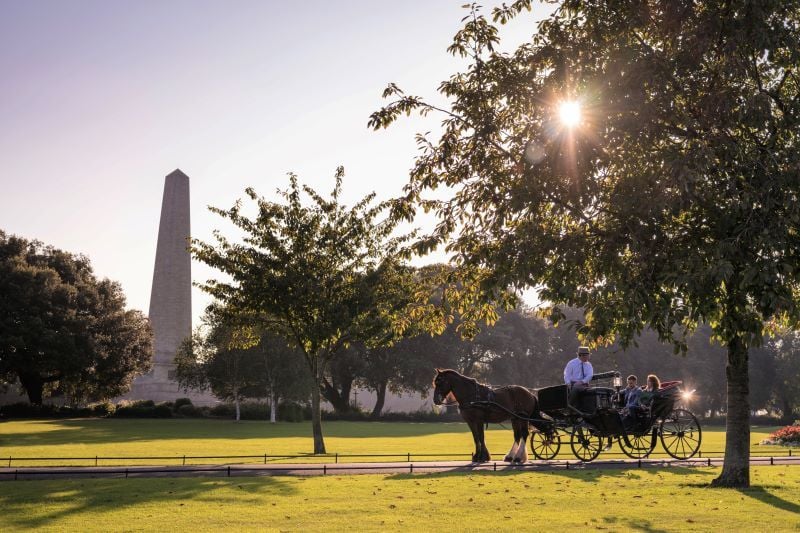In the 19th century the Irish name Bridget became synonymous with servitude here in the United States. Instead of saying 'maid' or 'servant' their bemused WASP employers began to give them the mocking nickname 'Irish Bridget's' or 'Biddy's.'
The reason for this is that in the 19th century servitude and Irishness had become practically synonymous. Cartoons appeared in the main newspapers lampooning Bridget's and Biddy's. The proliferation of Irish domestic servant women, especially in the years after the Great Hunger, made them a standing joke.
But in contrast to the ludicrous friendships seen between the upper and lower orders on the risible soap opera "Downton Abbey," these Bridget's weren't liked. In fact their largely Protestant employers thought them 'insubordinate, unrefined and prone to violent outbursts.'
I suspect I would have been insubordinate and prone to violent outbursts too if I had to cook and clean for the shaming, holier-than-thou employers they endured, ten hours a day, seven days a week.
Over time the name Bridget became so closely associated with joyless drudgery that parents stopped naming their girls after the Irish female patron saint (who, for the record, was earlier the great pagan mother goddess of the Gael prior to Christianity).
Nowadays Irish-Americans have largely forgotten about the domestic servant association and the name Bridget has become widespread again. But I think it’s a shame the old association has been forgotten because it has much to teach us about the hard journeys our ancestors made and the things they encountered here.
In the 19th century the feminine ideal was a life of submission and domesticity. But Irish women, then as now, did not fit that bill. Instead they were verbally assertive, spirited and ambitious. Employers began to lament what they called their 'Hibernian temper.'
I really couldn't be prouder of them for exhibiting that Hibernian temper, having lived through a near extinction event, then the loss of their national language, and the centuries long horror of British colonialism.
For all of these reasons the name Bridget has a special resonance for me, as it should for any Irish person. That’s why my ears perked up when they started calling the Icarian fall of Governor Chris Christie 'Bridgetgate.'
When Christie's deputy chief of staff Bridget Anne Kelly, 41, found herself blamed for the growing political scandal engulfing his administration ‘Bridgetgate’ took hold.
If she's been scapegoated for the machinations of much more powerful people, she won't be the first Irish Bridget to have had that happen to her. After all, we are being asked to believe that she woke up one morning and unilaterally decided to create traffic problems in Fort Lee.
It was remarkable to watch Christie portray himself as the real victim at yesterday's news conference. I was betrayed, he told the nation, betrayed by the top level people that I appointed and trusted. By the end of his conference he had accepted responsibility for the scandal but none of the blame.
Certainly it appears that Kelly initiated the traffic nightmare by emailing the Port Authority official David Wildstein saying: 'Time for some traffic problems in Fort Lee.' But did she plan it herself? Really? All alone?
Yesterday Christie called her behavior 'stupid' and 'deceitful' and vowed she had not disclosed her role in closing traffic lanes in Fort Lee, a town of 35,700 at the end of the George Washington Bridge.
'I have – I have not had any conversation with Bridget Kelly since the email came out,' Christie told the press yesterday. 'And so she was not given the opportunity to explain to me why she lied because it was so obvious that she had. And I'm, quite frankly, not interested in the explanation at the moment.'
I am interested in her explanation, actually. I would think as governor of the state of New Jersey he might be too. That makes me wonder if he already knows what she would tell him – or is he just reluctant to hear it? And whilst we're at it, out of curiosity, is this the first time that politically motivated 'traffic problems' have occurred there?
I suspect this tale is only getting started.
In the olden days WASP employers were exasperated by the spirited defiance of the native Irish women who staffed their homes and I wouldn't count this Bridget out too hastily yet either.
Underestimating old Bridgets has been a pastime in this country since the 19th century. Calling Bridgets ‘stupid’ and ‘deceitful’ has a long history too.
That's why I have an instinct that when the redacted emails, texts and calls surrounding this scandal come to light soon that this latest Bridget may end up having the last word after all.
You can't silence a Bridget. Our grandparents knew that, we'll remember soon ourselves I bet.




Comments